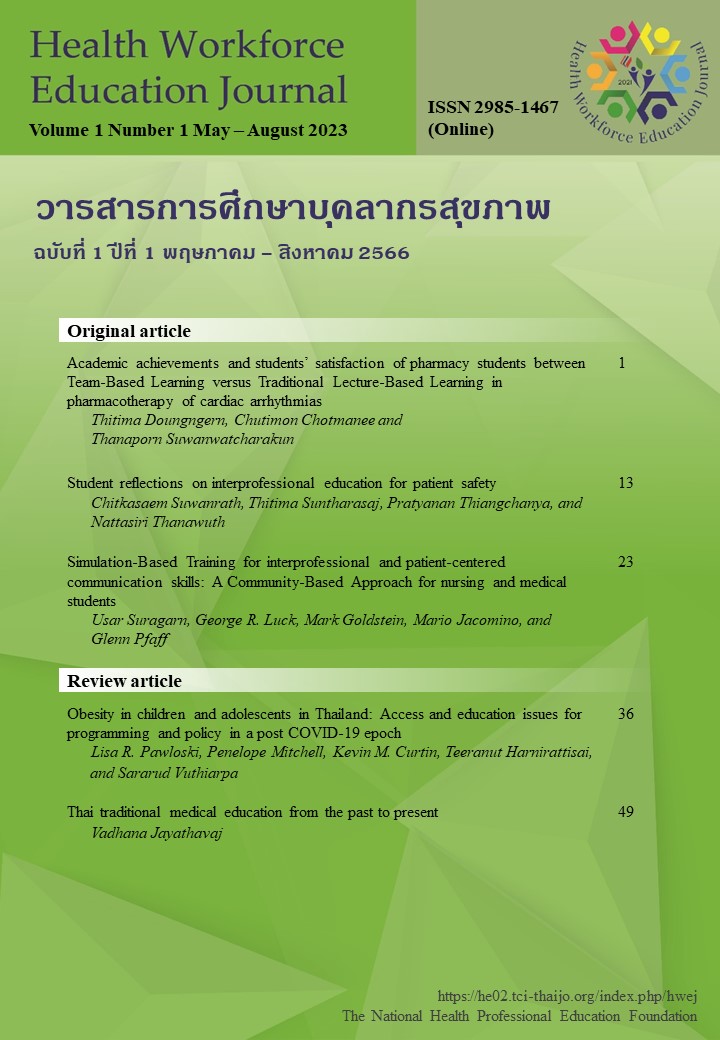Academic achievements and students’ satisfaction of pharmacy students between Team-Based Learning versus Traditional Lecture-Based Learning in pharmacotherapy of cardiac arrhythmias
Keywords:
learning outcomes, team-based learning, Students' satisfaction, pharmacy, lecture-based learningAbstract
Objectives: The study aimed to compare students’ knowledge and satisfaction with the two teaching methods, team-based learning (TBL) vs. traditional lecture-based learning, in fourth-year pharmacy students. Pharmaceutical Care students were assigned to the TBL and Pharmaceutical Science students were assigned to the traditional-lecture based learning.
Materials and methods: The study document was circulated to students a week in advance for preparation. The traditional lecture group listened to the presentations and discussions. The TBL group started with an individual test, followed by a team test, appeal, and knowledge application. Student satisfaction was assessed after class in both groups. Ten multiple-choice questions were used to evaluate their knowledge during the exam.
Results: The TBL group had higher exam scores compared to the traditional lecture group (6.85 + 1.53 vs. 5.17 + 1.67, p < 0.05). Both groups were satisfied with the information provided by the teacher in the classroom (p = 0.94). However, the TBL group was more satisfied with several aspects of the teaching and learning experiences, such as improving thinking skills for solving problems, enthusiastic to learn, and engaging learning environments than the traditional lecture group (p < 0.05).
Conclusions: The TBL method enhances knowledge and pharmacy students responded positively to the TBL method. Therefore, the TBL-method should be implemented in other subjects to enhance student learning outcomes.
References
Masters K. Edgar Dale’s pyramid of learning in medical education: A literature review. Medical Teacher. 2013;35:e1584-93.
Michaelsen LK. Getting start with team-based learning. In: Michaelsen LK, Knight AB, Fink LD, editors. Team-based learning: A transformative use of small groups in college teaching. 1st ed. Sterling: Stylus Publishing LLC, 2004:27-50.
Wiener H, Plass H, Marz R. Team-based learning in intensive course format for first year medical students. Croat Med J. 2009;50:69-76.
Nieder GL, Parmelee DX, Stolf A, Hudes PD. Team-based learning in a medical gross anatomy and embryology course. Clinical Anatomy. 2005;18:56-63.
Sananpanichkul P, Leaungsomnapa Y. Comparison of the effectiveness and satisfaction between lecture based and team-based learning program of medical student in gynecology. J Prapokklao Hosp Clin Med Educat Center 2013;30:192-200.
Nawabi S, Bilal R, Javed MQ. Team-based learning versus traditional lecture-based learning: An investigation of students’ perceptions and academic achievements. Pak J Med Sci. 2021;37(4):1080-5.
Zhang Q, Tang Z, Zhao Y, Wang Z. Team-based learning vs. lecture-based learning: A systematic review of randomized controlled trial. Front Public Health.2023.10:1044014 doi: 10.3389/fpbh.2022.1044014.
Methaneethorn J, Methaneethorn J. A systematic review of using team-based learning in a pharmacokinetics course. Pharmacy Education.2022;21(1):63-72.
Bormann S von, Khumkom S, Khaobunmasiri S, Wajanatinapart P, Jai-ai R. Effects of team-based learning on critical thinking, problem solving skills, and attitudes towards learning in second-year nursing students. Nursing J Public Health. 2022;32(2):22-35.
Allen RE, Copeland J, Franks AS, Karimi R, McCollum M, Riese II DJ, et al. Team-based learning in US colleges and schools of pharmacy. Am J Pharm Ed. 2013;77(6) Article 115.
Ofstad W, Brunner LJ. Team-based learning in pharmacy education. Am J Pharm Ed. 2013;77(4) Article 70.
Dejarkorm C, Sudhorm K. Medical students’ attitudes toward active learning in radiology. Buddhachinaraj Medical Journal. 2010;27:441-6.
Sirirat N, Chidnayee S. Effect of team-based learning in nursing care of persons with health problems 1 on achievements and critical thinking in nursing students. Journal of Health Science. 2009;3(2):32-40.
Letassy NA, Fugate SE, Medina MS, Stroup JS, Britton ML. Using team-based learning in an endocrine module taught across two campuses. Am J Pharm Ed. 2008;72(5) Article 103.
Beatty SJ, Kelley KA, Metzger AH, Bellebaum KL, McAuley JW. Team-based learning in therapeutics workshop. Am J Pharm Ed. 2009;73(6) Article 100.
Conway SE, Johnson JL, Ripley TL. Integration of team-based learning strategies into a cardiovascular module. Am J Pharm Ed. 2010;74(2) Article 35.
Tweddell S, Clark D, Nelson M. Team-based learning: The faculty experience. Currents in Pharmacy Teaching and Learning. 2016;8:7-17.

Downloads
Published
How to Cite
Issue
Section
License
Copyright (c) 2023 Health Workforce Education Journal

This work is licensed under a Creative Commons Attribution-NonCommercial-NoDerivatives 4.0 International License.
Authors must also attest that the manuscript is previously unpublished, not currently under consideration elsewhere and will not be submitted for publication elsewhere regardless of language and is submitted only to the Journal. Manuscripts under multiple publication policy are exempt from the said practice. Articles published in the Health Workforce Education Journal are copyrighted. No part of the articles may be copied, modified, reproduced or utilized in any form for any purposes without permission from the Journal. If excerpts from other copyrighted works are included, the Author(s) must obtain written permission from the copyright owners and credit the source(s) in the manuscript. All statements in, or omissions from, published manuscripts are the responsibility of the Authors, who will assist the editors by reviewing proofs before publication. The contents and opinions presented in the articles published in Health Workforce Education Journal do not reflect the opinion shared by the Journalûs editorial board.


